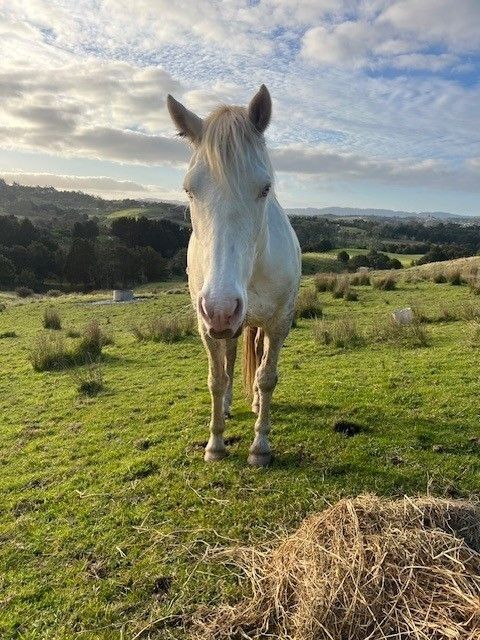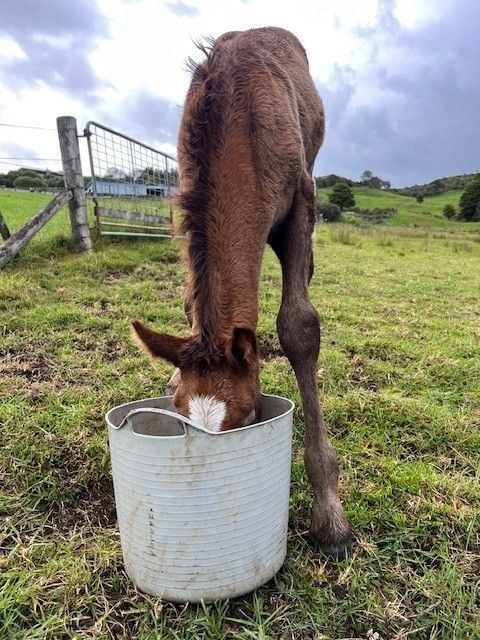Nutrition
Proper nutrition is the foundation of good health for any horse, particularly for Off The Track Thoroughbreds (OTTBs), who often have specific dietary needs. This guide will help you create a balanced feeding plan that ensures your horse maintains optimal health, weight, and energy levels.
A horses' diet should always be adjusted slowly and steadily to avoid any gastric-upset from introducing new feed types too quickly.
If you have a horse that is malnourished and underweight, then introduction of food needs to follow a strict re-feeding programme. Please contact us for advice on caring for an underweight, malnourished horse.

The Importance of Forage
Forage should always be the number one priority in any horse's diet. A horse’s digestive system is designed for continuous grazing, making high-quality fibre essential.
Quality hay or mature grasses should make up at least 95% of the diet and be available 24/7. Horses are grazing animals, and even those on restricted diets need continuous access to fibre sources to avoid any potential metabolic issues.
Avoid rich baleage, silage or fermented products, which can cause digestive upset in those with sensitive insides.
If pasture quality is poor, supplement with additional hay.
Grass can often have a bad rap in the horse world, and managing grass intake carefully is important for all horses but particularly those who are prone to metabolic diseases such as laminitis, or those who are affected by fresh, green grass.
Mature, drier grasses (of certain varieties) are perfectly safe to eat for the majority of horses, but always consult with an expert if you are unsure if your horse should be grazing certain grass types.
Short, fresh green or stressed-out and over-grazed grasses can cause problems in certain horses, so proper pasture management is important to avoid over-grazing.
Omega 3 Supplementation
Most horses do not get adequate omega-3 fatty acids from their diet. Balancing omega-3 to omega-6 ratios is key to promoting overall health.
Best sources: Linseed (Flaxseed) and Chia seed.
Recommended daily amounts:
20g whole linseed per 100kg body weight OR
50-60ml good quality cold-pressed flaxseed oil.
Base Feed & Hard Feeds
Hard feeds should be used as a supplement to forage and not as a primary food source. Choose simple, high-quality options that avoid unnecessary fillers and additives.
Base Carrier Feed
This acts as a palatable mix for supplements and additional nutrients.
Copra meal, or beet pulp, or another suitable, fibre based mix for palatability and fibre
Soaked Timothy/Lucerne pellets along with
A large scoop of chaff (Timothy, Meadow, Lucerne, Oaten) – fed together and wetted down.
If transitioning feeding regimes, introduce new feeds gradually over several weeks.
Salt and Other Supplements
Horses require sodium chloride supplementation as most forage does not contain enough salt.
Daily recommendation: 10g per 100kg body weight (1 tablespoon = 17g).
Free access to fresh water is essential, as salt increases thirst.
Forage alone doesn't meet the nutritional requirements of horses in New Zealand, as our grasses and soils are lacking in certain minerals that are essential for horse health. The mineral requirements of each horse is different, depending on their diet, age, level of activity and any other medical needs they may have. For example a growing foal and a retired horse will have vastly different needs.
Always consult with a professional to ensure any supplements you are adding to your horses diet are suitable for their age and stage. There are several reputable supplement and mineral brands that are tailored to New Zealand conditions that provide a range of mineral blends suited to a variety of horses such as mares and foals, in work or spelling horses. Make sure you research options and chat with a qualified professional to ensure your horses supplement needs are met.
Extra Protein & Calories
Most horses thrive once their forage, protein, and mineral needs are met. However, those needing extra condition or workload support may benefit from additional feeds:
Increase quality hay intake.
Add Lucerne, Timothy, or hay pellets/chaff.
Increase fresh crushed linseed (up to 100g per 100kg for weight gain).
Hemp meal, pellets, or oil – great protein source for horses that may be sensitive to soy.
Lupins or Peas – high-protein options but not suitable for metabolic horses.
Rice Bran – useful for weight gain but should be balanced with linseed.
Feeds to Avoid
Some common commercial feeds and ingredients may cause digestive issues, inflammation, or metabolic imbalances. These can be problematic for some horses, but some do just fine on them, too. It is important to know your horse and assess what does and does not work for them.
If feeding a balanced mineral mix, then avoid pre-mixed "all in one" feeds as they can disrupt the balance of your feed since you've already met these needs with their fibre, protein and supplement mix.
Soy products can be inflammatory to some horses, but not all (soybean meal, soy hulls, soybean oil).
Canola/Rapeseed oil/meal is high in protein and can lead to nitrogen overload, excess urination and metabolic issues.
Maize and corn are super high energy and can lead to digestive upset or metabolic issues.
Rye, clover, molasses, or feeds with added iron can cause oxidative stress.
Feeding Plan Example (500kg Horse)
Here’s an example of a simple baseline feeding plan you could start with for your new horse. Every horse is different and there’s no one-size-fits-all solution, but this provides a solid, affordable foundation to build on and adjust as needed.
Daily Ration:
Forage: Unlimited quality hay and mature grass.
Base Feed:
1 cup Lucerne/Timothy hay pellets (soaked) OR
1 cup Copra (soaked)
A large scoop Timothy chaff
Omega-3: 10g per 100kg whole linseed OR 60ml flaxseed oil.
Salt: 10g per 100kg body weight.
Minerals & Supplements: Ensure balanced ratios tailored to your horse’s needs.
A well-balanced diet does not need to be complicated. Focus on quality forage, proper mineral balance, and targeted supplementation for optimal health. Avoid overfeeding processed hard feeds and stick to simple, whole-food nutrition. If you need personalised feeding advice, consult with an equine nutritionist or vet.
Note: This information is intended as a general guide. Always consult with a professional for advice tailored to your horse's individual needs.

If you need more support and would like assistance from a qualified professional, we are here to help. The Rodney Animal Rescue Education Fund is available to help new horse owners, particularly those who have taken on an Off-the-track-Thoroughbred, and feel they are out of their depth or need assistance to ensure your new equine friend has all their needs met.
Learn more about the RAR Education Fund!
